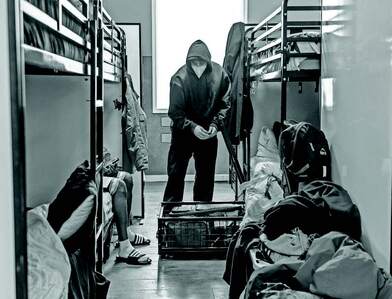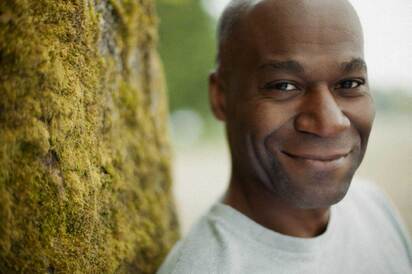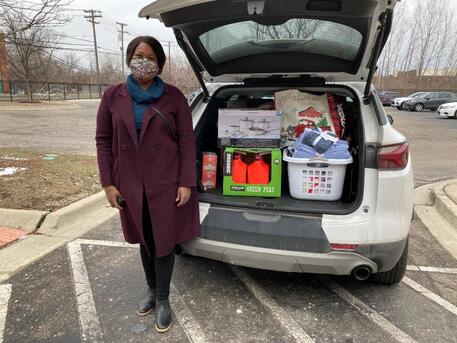|
During the peak of the pandemic, the medical needs of our shelter clients became very apparent. After relocating the Tumaini Center to a larger space to allow us to adhere to CDC safety protocols, we decided to shift our model of service delivery to meet the needs of our clients. The birth of the Detroit Healthy Housing Center was the start of a new era at NSO, where we have fully embraced the complexity of the unique population that we are honored to serve.
 In July of 2021, a young couple in their early 20’s arrived at the shelter after moving from out of state to stay with a relative who took their rent money and then evicted them after only few days. The couple was devastated, which was compounded by the fact that the young woman was pregnant. Because she had moved to Michigan from another state, she did not have Michigan Medicaid and was not receiving any prenatal care.  I am pleased to announce that Debra Williams has agreed to serve as the COO of NSO! Debra has a wealth of experience as a chief human resource and business operations executive. She has expertise in transformative leadership and performance management. In addition to the COO responsibilities, Debra will continue to provide oversight for Human Resources.  It was after several winters of sheltering the homeless men at night and learning they were increasingly stumbling around in the snow by day — sometimes sleeping out in it —that the plight of Jim and Gary came dramatically to Elizabeth Kelly’s attention. As their conditions deteriorated, Jim and Gary had been in and out of Pontiac’s main hospital, at that time called POH Medical Center. They first had their frozen toes thawed, next amputated one by one, followed by amputations of entire feet, and then ultimately came their pitiful deaths. Kelly, founder of a homeless shelter called HOPE Warming Center on Pontiac’s north side, had tried to help Jim and Gary, but she couldn’t. Suddenly, she realized why. “One of them cost the hospital $1.5 million in care. The other one, $1.2 million. And so I sat down with the hospital’s CEO and I said, ‘There’s a better way. Let’s work together on this. I think I have the answer.’ Read Full Article Resource Detroit Free Press  There was no support system for John to fall back on due to various complexities with his family, which contributed to a strained relationship with them. As a result, he did not reach out to them for support. Also during this time, his mounting emotional and psychological issues made it challenging for him to hold steady employment as he went from one job to another. John is a military veteran who served for 5 years in Afghanistan during Desert Fox. Upon discharge from the military, John struggled greatly with anger and substance use, which were compounded by mental health issues.  Board Member Niccala Lee has a deeper understanding of the profound impact that NSO programs can have on people's lives. In the past, Lee has experienced homelessness and uses that to inform her perspectives and decisions as an NSO Board Member. 1. Why are you motivated to serve on the NSO Board of Directors? I am interested in serving because I want to be part of the solution to ending homelessness in the city of Detroit and surrounding areas. I am also interested as to how I could be of help regarding the factors that may lead to homelessness.  Mr. R is a 60-year old man who had been experiencing homelessness since 2019 following a divorce. He was also diagnosed with schizoaffective disorder which was marked by hallucinations, delusions and severe mood swings. Because he was also opiod-dependent, his severe behavioral patterns were amplified, prompting severe manic depressive episodes that resulted in numerous short stays at various shelters, with each stay lasting only a few days due to relapses in which he would end up staying outdoors, in vacant homes, or in the hospital.  Colorectal Cancer is the second leading cause of cancer related deaths among Americans, with Black Americans having a 40% higher death rate compared to White Americans. However, if caught and treated early, there is a 90% survival rate. Edward Scott now has a place to call home. He was shocked walking into his new apartment in the Bell Building for the first time. There was a microwave and toaster on the counter, dishes in the cabinet, silverware in the drawer, even a mop and broom. Upon seeing his furnished home, Edward said, “this was the nicest apartment I’ve ever had."
 A client, who we will call Deborah, in order to respect her confidentiality, began working with NSO during a period in which she fell on the hardest of times. She was in her early 50’s, homeless, had no place to go and was living and sleeping in her car. Other added challenges that compounded her situation were acute and severe mental illness that prompted episodes of emotional instability along with various other physical health challenges. |
AuthorWrite something about yourself. No need to be fancy, just an overview. Archives
November 2022
Categories
All
|


 RSS Feed
RSS Feed
